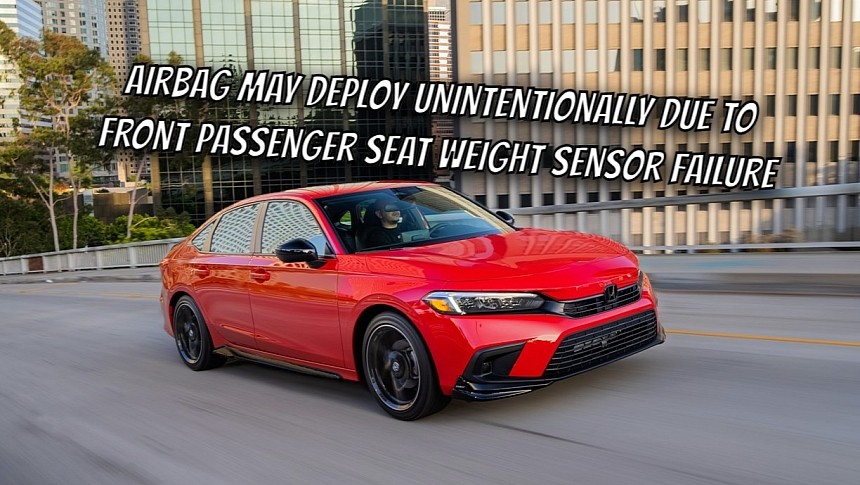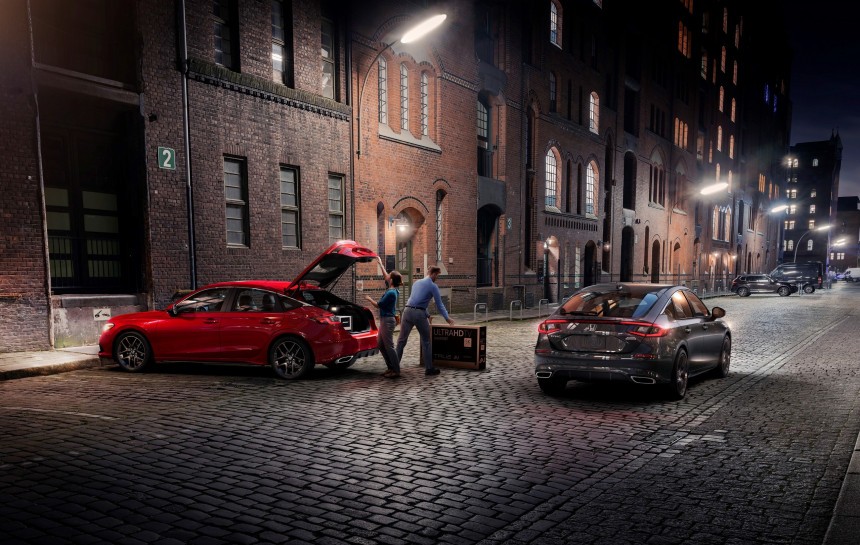Honda has issued a mammoth recall comprising 750,114 vehicles produced for the 2020 through 2022 model years. The safety concern is unintentional deployment of the front passenger frontal and knee airbags during a crash despite the presence of a person lighter than a 5th percentile woman (an AF5 crash test dummy weighs 108 pounds or 49 kilograms), a child, or an infant. For said examples, the airbags should not deploy.
The root cause is the front passenger seat weight sensor, which features a printed circuit board. A capacitor of said PCB may develop a crack, leading to a short circuit. Due to sensor failure, the front passenger's weight does not reach the control unit of the supplemental restraint system. The sensor in question was produced by Aisin Electronics Illinois, a US-based subsidiary of the Aisin Corporation.
Specialized in all things automotive control units, Aisin Electronics Illinois changed the base material in the printed circuit board due to a natural disaster at the manufacturing plant of a tier-2 supplier. The tier-1 supplier and Honda determined that said material could allow additional strain to the printed circuit board, hence the capacitor going kaput.
In the event of a failed sensor, the SRS warning light will illuminate and the passenger airbag indicator will remain off. According to documents filed with the federal watchdog, two sensor assemblies are recalled. Their part numbers are 81167-T2F-L012-M1 and 81168-T2F-L012-M1, respectively.
Honda received the first warranty claim over said problem in August 2020. The automaker originally investigated the condition with Aisin Electronics Illinois through March 2021, but neither party could find any defects at the time. However, the investigation resumed a few short months later as Honda continued to receive warranty claims from customers in the US alleging faulty sensors.
On January 25 this year, American Honda Motor Co. was aware of a grand total of 3,834 claims in the United States market. Said claims were filed with the automaker in the period between June 13, 2020 and January 19, 2024. As expected, the remedy comes in the form of all-new circuit boards produced with the correct material. The report attached below reads that vehicles produced on and after January 7, 2022 feature PCBs with the correct base material rather than the suspect material.
Owner notifications will be mailed no later than March 18, 2024. In the meantime, owners can easily determine if their vehicles are recalled by entering the 17-character VIN on the automaker's website or the National Highway Traffic Safety Administration's website. Regarding the recalled vehicles, no fewer than 13 nameplates are listed.
Starting with Acura, the list kicks off with the 2020 to 2021 model year TLX, 2020 to 2022 RDX, the 2020 MDX, and the 2022 MDX. The Honda division, meanwhile, has to fix a plethora of vehicles from the Ridgeline, Passport, Pilot, Odyssey, Insight, HR-V, Fit, CR-V, Civic, and Accord lines. The 2021 model year Civic Type R is the most high-performance model of the bunch.
Production dates range between April 25, 2019 and January 7, 2022. If you own a potentially affected vehicle, please get in touch with your nearest dealership as soon as possible to inquire about parts availability and to schedule an appointment.
Specialized in all things automotive control units, Aisin Electronics Illinois changed the base material in the printed circuit board due to a natural disaster at the manufacturing plant of a tier-2 supplier. The tier-1 supplier and Honda determined that said material could allow additional strain to the printed circuit board, hence the capacitor going kaput.
In the event of a failed sensor, the SRS warning light will illuminate and the passenger airbag indicator will remain off. According to documents filed with the federal watchdog, two sensor assemblies are recalled. Their part numbers are 81167-T2F-L012-M1 and 81168-T2F-L012-M1, respectively.
Honda received the first warranty claim over said problem in August 2020. The automaker originally investigated the condition with Aisin Electronics Illinois through March 2021, but neither party could find any defects at the time. However, the investigation resumed a few short months later as Honda continued to receive warranty claims from customers in the US alleging faulty sensors.
Owner notifications will be mailed no later than March 18, 2024. In the meantime, owners can easily determine if their vehicles are recalled by entering the 17-character VIN on the automaker's website or the National Highway Traffic Safety Administration's website. Regarding the recalled vehicles, no fewer than 13 nameplates are listed.
Starting with Acura, the list kicks off with the 2020 to 2021 model year TLX, 2020 to 2022 RDX, the 2020 MDX, and the 2022 MDX. The Honda division, meanwhile, has to fix a plethora of vehicles from the Ridgeline, Passport, Pilot, Odyssey, Insight, HR-V, Fit, CR-V, Civic, and Accord lines. The 2021 model year Civic Type R is the most high-performance model of the bunch.
Production dates range between April 25, 2019 and January 7, 2022. If you own a potentially affected vehicle, please get in touch with your nearest dealership as soon as possible to inquire about parts availability and to schedule an appointment.









